Related Research Articles

Mary Baker Eddy was an American religious leader, Christian healer, and author, who in 1879 founded The Church of Christ, Scientist, the Mother Church of the Christian Science movement. She also founded The Christian Science Monitor in 1908, and three religious magazines: the Christian Science Sentinel, The Christian Science Journal, and The Herald of Christian Science.
The Christian Science Journal is an official monthly publication of the Church of Christ, Scientist through the Christian Science Publishing Society, founded in 1883 by Mary Baker Eddy. The first edition appeared on April 14, 1883, bearing the subtitle, "An Independent Family Paper to Promote Health and Morals". At that time, Eddy was the editor and main contributor to the Journal. The magazine is based in Boston.

The Destiny of The Mother Church is a book about Christian Science written by Bliss Knapp, published privately by him in 1947, and publicly in 1991 by Christian Science Publishing Society. Knapp and his parents, Ira O. and Flavia Stickney Knapp, all knew Christian Science founder Mary Baker Eddy. His parents were students of hers and his father was one of the original members of the Board of Directors of The First Church of Christ, Scientist. Until 1991, the book was repeatedly rejected for publication by the church's Board of Directors because of its depiction of Eddy as the fulfillment of biblical prophecy and equating her with Jesus, a position which Eddy considered blasphemous. Destiny's publication caused divisions within the church, including several resignations of prominent church employees. Critics claimed that the failure of the church's then-recent television venture, which had cost the church several hundred million dollars, had motivated the Board's reversal on publishing Knapp's book. Knapp, his wife and her sister left wills that granted bequests totalling over $100 million promised to the church if the book were to be published. The wills set a time limit of 20 years for the book to be published, otherwise the bequests were to be divided between Stanford University and the Los Angeles County Museum of Art, and the church would receive nothing. The 1973 death of Knapp's wife set the date of the time limit to May 1993.

Septimus James Hanna, an American Civil War veteran and a judge in the Old West. He was a student of Mary Baker Eddy, who founded the Christian Science church. Giving up his legal career, he became a Christian Science practitioner, lecturer and teacher. Hanna occupied more leading positions within the church organization than any individual, serving as pastor, then First Reader of The Mother Church, as editor and associate editor of the periodicals, member of the Bible Lesson Committee, he served two terms as president of The Mother Church, he was teacher of the Normal (teachers) Class of 1907, later vice president and then president of the Massachusetts Metaphysical College.
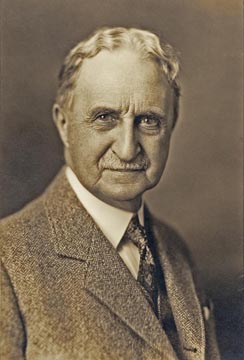
William Roedel Rathvon, CSB,, sometimes incorrectly referred to as William V. Rathvon or William V. Rathbone, is the only known eyewitness to Abraham Lincoln's Gettysburg Address, of the over 10,000 witnesses, to have left an audio recording describing that experience. He was nine years old when he personally saw the address live with his family, and made the recording in 1938, a year before his death. A graduate of Franklin and Marshall College in Lancaster, Pennsylvania, and a successful businessman, he became a Christian Science practitioner, served as a public lecturer, Church treasurer and director of The First Church of Christ, Scientist in Boston, Massachusetts. He was treasurer from 1911 until he was elected to the Church's Board of Directors, on which he served from 1918 until his death in 1939. From 1908 to 1910 he was correspondence secretary for Christian Science founder Mary Baker Eddy. He also authored "The Devil's Auction", often republished without attribution as "The Devil's Garage Sale".

The Massachusetts Metaphysical College was founded in 1881 by Mary Baker Eddy in Boston, Massachusetts, to teach her school of theology that she named Christian Science. After teaching for almost seven years, Eddy closed this college in 1889 in order to devote herself to the revision of her book, Science and Health with Key to the Scriptures, but retained her charter and reopened the college in 1899 as an auxiliary to her Church.

The Mary Baker Eddy Library is a research library, museum, and repository for the papers of Mary Baker Eddy, the founder of Christian Science.

The Dupee Estate, located at 400 Beacon Street in the village of Chestnut Hill, Newton, Massachusetts, was the last home of Mary Baker Eddy, the founder of Christian Science.

John Munro Longyear Sr. was an American businessman and noted developer of timber and mineral lands in the Upper Peninsula of Michigan and Minnesota who became the central figure behind the Arctic Coal Company, which surveyed and mined coalfields on Spitsbergen, from 1905 to 1916. This company developed a settlement on Spitsbergen able to accommodate up to around 500 people which became known as Longyear City, now Longyearbyen, adjacent Advent Bay.
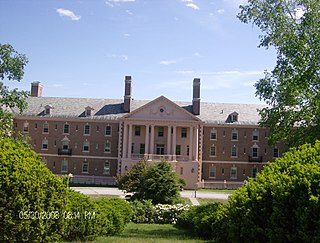
The Pleasant View Home is an historic senior citizen residential facility located at 227 Pleasant Street in Concord, New Hampshire, in the United States. On September 19, 1984, it was added to the National Register of Historic Places.
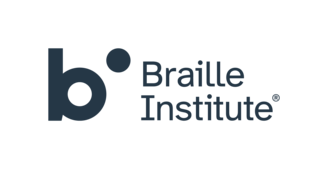
The Braille Institute of America (BIA) is a nonprofit organization with headquarters in Los Angeles providing programs, seminars and one-on-one instruction for the visually impaired community in Southern California. Funded almost entirely by private donations, all of the institute's services are provided completely free of charge. The organization has seven regional centers: Anaheim, Coachella Valley, Laguna Hills, Los Angeles, Riverside, San Diego and Santa Barbara, as well as outreach programs at more than 200 locations throughout Southern California. It is a member of the Braille Authority of North America.

Prof. Christopher A. Rollston is a scholar of the ancient Near East, specializing in Hebrew Bible, Greek New Testament, Old Testament Apocrypha, Northwest Semitic literature, epigraphy and paleography.

J. Robert Atkinson was the founder of the Universal Braille Press in 1919 in Los Angeles, later known as the Braille Institute of America, and published the first Braille edition of the King James Version of the Bible, among other books. Atkinson became an innovator and advocate for the blind, working to enable the sight-impaired to lead normal lives.

Rev. Irving Clinton Tomlinson was an American Universalist minister who converted to Christian Science, becoming a practitioner and teacher. For a time, he lived as one of the workers in the household of church founder, Mary Baker Eddy, later writing a book about his experiences called Twelve Years with Mary Baker Eddy.

Annie MacMillan Knott was a practitioner and teacher in The First Church of Christ, Scientist. She was a student of Mary Baker Eddy, the founder of the religion, and served the church in various capacities including First Reader, Associate Editor of the Christian Science periodicals, member of the Bible Lesson Committee, one of the first women on the Christian Science Board of Lectureship, Trustee under the Will of Mary Baker Eddy, and the first woman to become a member of the Christian Science Board of Directors.
Eileen Marie Schuller is a professor at the Faculty of Social Sciences at McMaster University in Hamilton, Ontario. Schuller is an official editor of the Dead Sea Scrolls. She teaches undergraduate and graduate studies in the Biblical field. Over a span of 30 years, her involvement in the publication of the Dead Sea Scrolls has led to numerous contributions in authenticating the discoveries found in the caves near the Ancient Qumran settlement.
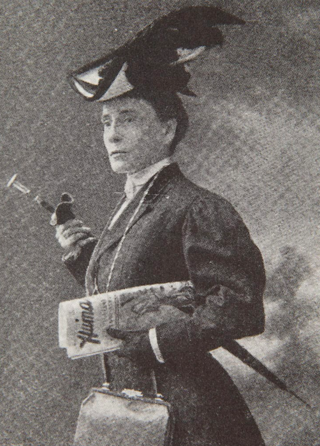
Sibyl Wilbur O'Brien Stone, best known as Sibyl Wilbur, was an American journalist, suffragist, and author of a biography of Mary Baker Eddy. She was a San Diego Branch Member of the National League of American Pen Women and a member of the New England Woman's Press Association.

Adam Herbert Dickey, was an author, member of the Board of Directors of The First Church of Christ, Scientist, and a secretary to Mary Baker Eddy.
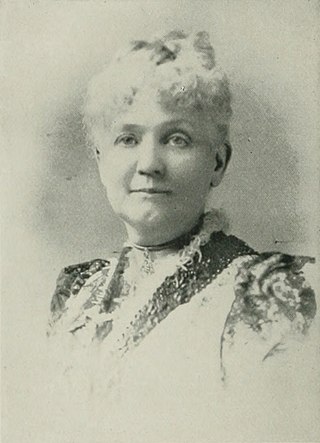
Sue Harper Mims, C.S.D., was a social leader in Atlanta, Georgia and the wife of Livingston Mims, the 37th mayor of Atlanta, Georgia, United States. She was a member of The First Church of Christ, Scientist, and helped found its branch church in Atlanta.

Temple Beth Sholom is a Reform Jewish synagogue located at 233 Blaker Street, in Marquette, Marquette County, Michigan, in the United States. Founded in 1953 in Ishpeming, Temple Beth Sholom is the successor to multiple smaller congregations present in the Marquette area since the early 20th century. Temple Beth Sholom is one of two Jewish congregations in the Upper Peninsula, the other being Temple Jacob in Hancock.
References
- 1 2 3 4 5 "Two trains moved this family's house". Battle Creek Enquirer. June 6, 2005. Archived from the original on June 24, 2013. Retrieved June 21, 2013.
- 1 2 3 4 5 Byquist, Kelly (6 October 2020). "The Endowment for Biblical Research, Boston celebrates a historic milestone". Longyear Museum.
- 1 2 "Descendants of John Beecher 1594-1637". RootsWeb. Retrieved June 21, 2013.
- 1 2 3 Stratton, Robert E. (April 22, 1975). "There Was No Place Like Home for the Longyears". The Milwaukee Journal. part 1, p. 10. Retrieved June 21, 2013– via Google News.
- 1 2 "The Longyear Story". Longyear Museum. Archived from the original on March 1, 2012. Retrieved June 21, 2013.
- 1 2 Tuttle, Dean & Tuttle, Naomi. "Biography of John Robert Atkinson, Inducted 2002". Hall of Fame. Retrieved June 18, 2013.
- 1 2 Pioneers in Christian Science. Longyear Museum & Historical Society. 1993.
- ↑ Gottschalk, Stephen (2006). Rolling Away The Stone: Mary Baker Eddy's Challenge to Materialism. Indiana University Press. pp. 187–188.
- ↑ Smith, Clifford P. (1 September 1934). "EARLY HISTORY OF CHRISTIAN SCIENCE IN GERMANY". The Christian Science Journal. 52 (6): 309–313.
- ↑ Whitney, Kyle (February 15, 2012). "Longyear mansion set to be auctioned". The Mining Journal . Marquette, MI. Retrieved June 20, 2013.
- ↑ Melton, J. Gordon (1993). Directory of religious organizations in the United States. Gale Research Inc. p. 303. ISBN 978-0-8103-9890-0.
- ↑ "J. Robert Atkinson". Longyear Museum. June 10, 2013. Archived from the original on June 24, 2013. Retrieved June 18, 2013.
- ↑ Murray, Michael (February 2009). "History on the Move". Marquette Monthly. Retrieved June 22, 2013.